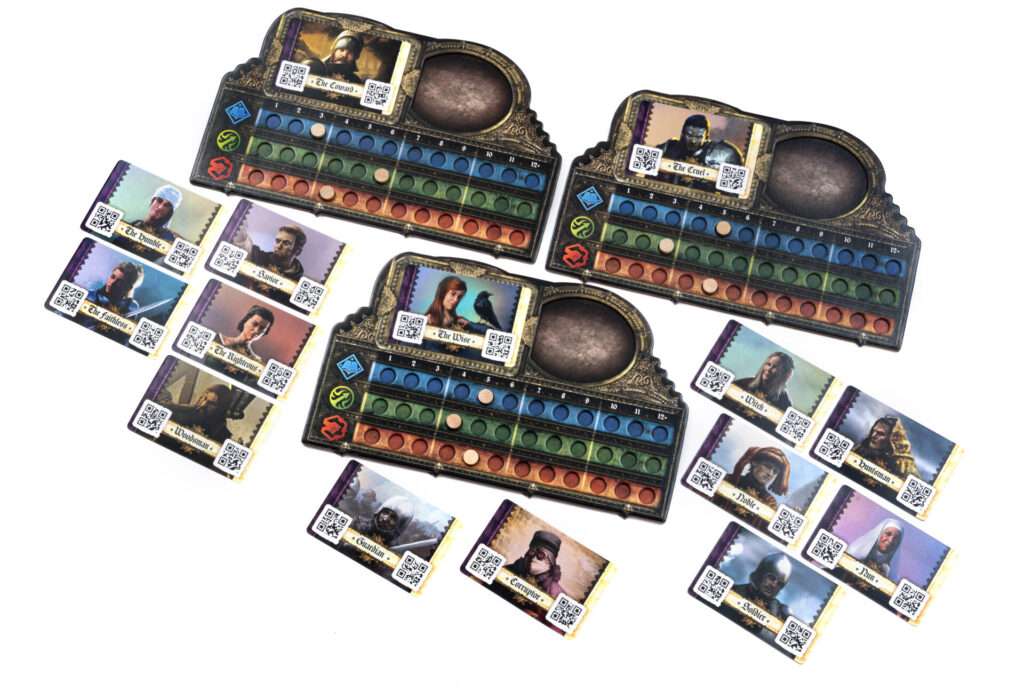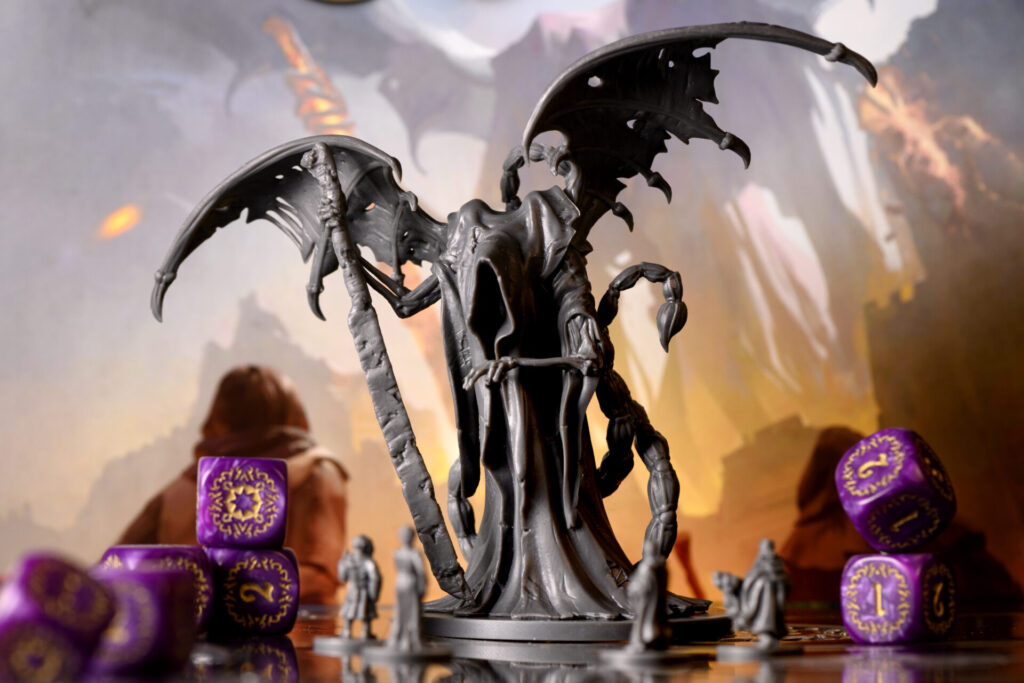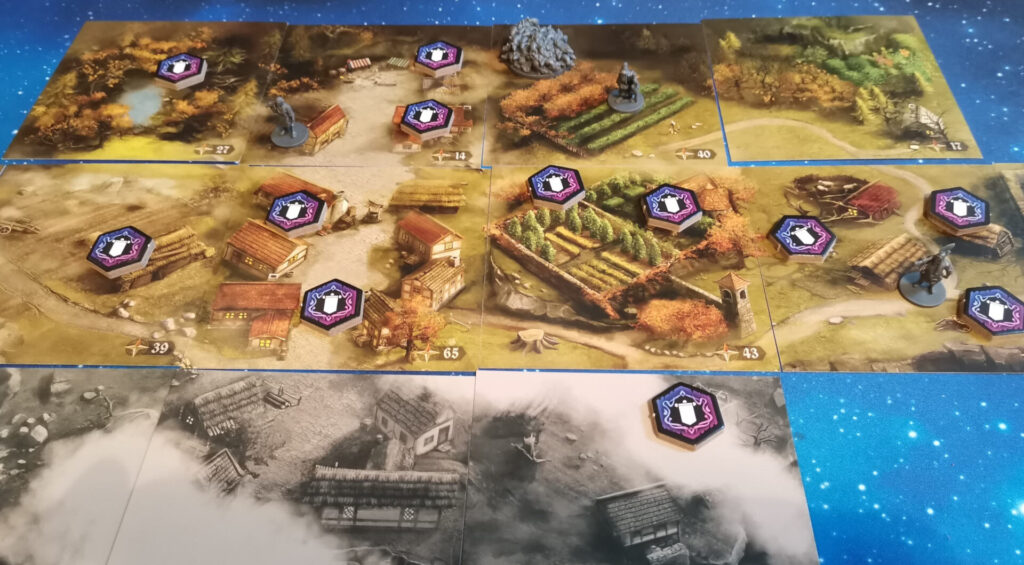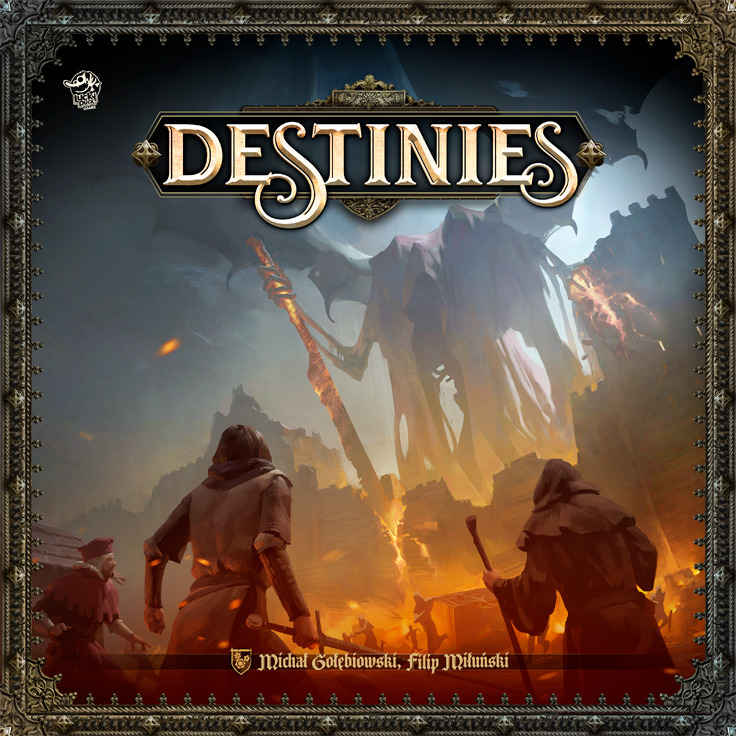Destinies is the new mini-packed, fantasy game from Lucky Duck Games. Like other Lucky Duck games, it uses an app to control what’s happening in the story, and once again, I’ll urge anyone with a phobia of such things to at least give it a chance. Through a mixture of placing tiles and rolling dice, players assume the role of a character in each scenario, and choose how best to fulfil their own destiny, while others race to do the same. Destinies in this case are missions, and each destiny is secret to the player, and has two different ways to get there. It’s up to you to choose which option you want to pursue, and what costs you’re comfortable with to accomplish it.
With each turn you make a decision about where you want to move, and whether you want to explore a new area, or visit a character or point of interest you’ve already uncovered. The app explains what’s happening in the story, with a cool atmospheric soundtrack playing in the background. Along the way you collect items, fulfil side quests for people, and learn more about the world you inhabit. As with the Chronicles of Crime titles before it, Destinies makes heavy use of QR codes. If you ask an NPC for a hint towards your destiny, you scan your card. Want to use an item at a location? Scan the card. It quickly becomes second nature.
Riding your luck
The system for combat and tests in Destinies is really clever. Each player has a board with three tracks on it: intelligence, dexterity and power. Your character begins with wooden markers at several points along each track, and through gaining experience and completing quests, you can move those markers to the left, to lower values. When you roll a number of dice to perform a test, you total their values and compare it to the markers on that track. The number of markers equal to or lower than that value, are the number of successes you make. The item cards you collect along the way can be expended at different times to mitigate bad rolls too.

It’s a really elegant system, and really lets you shape your character to the way you think you want to play them. It keeps the game ticking along at a quick pace, but it does get repetitive. If you don’t mind chucking dice ’til the cows come home though, you’ll be in your element. This streamlined approach runs through the whole game too. The rule book is very easy to read and understand, and it’s a game you can teach to new players in no time at all.
Competitive narrative
Destinies launched on Kickstarter selling itself as a competitive narrative game. It’s a type of game that’s very difficult to get right, with The King’s Dilemma being my favourite example so far. Within each scenario of the game, a story is unfolding, and a world is developing right in front of you. When I first played the game solo, to learn the ropes, I thought this was really cool. I was exploring, unlocking new locations, talking to new people, choosing where to go at my leisure. Playing competitively for the first time, was a different experience.

When the game starts, you know very little about the scenario you’re playing. There’s a couple of people and places to visit and four cardinal directions to start exploring. So what do you do first? You could head north, start exploring, talking to people, hoping to find something to further your quest. But what if there’s nothing relevant that way? What if your opponents headed in a different direction and are already on the right track? I found this frustrating at first, because once someone’s got a head start, it can be hard to overhaul them in Destinies.
However, having played it more, I tried re-framing my expectation of the game, and it really helped. The word ‘narrative’ is the important part here, not competitive. If you go into Destinies with a ‘must win at all costs’ viewpoint, you’re likely to come away disappointed.
Defining expectations
If you can accept the fact that the game is going to be exploratory and vague at times, I think you’ll really enjoy Destinies. It doesn’t hold your hand and say “You need to go west and investigate the old church” right from turn one. You will get hints like that, but they only come by exploring and talking to people. You never know if helping someone who’s asking you for something is going to give you something amazing towards your quest, or something unrelated. Frustrating and annoying at times, that’s just the kind of game it is though.
Once you abandon the competitive mindset, the game starts to become much more enjoyable. Now, I can understand if this sounds like I’m making excuses for the game here. A competitive game that’s best when you’re not being too competitive?! Maybe that’s a fair comment, but the point here is that there’s a really good adventure game waiting to be played. I just personally find that playing it with too much emphasis on the competition can be frustrating. All of that said though, I did play a couple of really tense scenarios where it came right down to the wire for who won.

There are two different solo modes in the box: Explorer and Challenger. I’ve played both, and I far preferred the Explorer option. It’s a game of exploration and doing things in your own time, soaking up the world. It’s not difficult, but it’s great fun. Challenger mode, however, is really tough. There’s time pressure, there are special events happening, and the whole thing feels much more stressful. I lost one scenario twice before I finally cleared it, and I’m not sure I’d have tried a fourth time.
Final thoughts
Destinies is a good game. The minis, components, artwork and app are all really good, and the whole thing feels high-quality from start to end. As I’ve mentioned above though, it’s not going to be a game for everyone. Really competitive players are likely to feel plenty of frustration when things don’t go their way, and it can really expose the luck that encompasses the early part of the game. The luck of starting in the right direction, and talking to the right person. If you can live with that though, or can play and not worry about who wins, you’ll have a great time.
It’s pretty decent solo, especially if you’re looking for something to scratch that RPG-lite itch. I think it’s most fun with two or three players though. You’ll see more of the map, and hear what happens to the other players while they’re off doing their thing. Maybe you’ll hear something to bank for later, a hint or a clue that helps you out. The stories are really good too. They’re not just the tried and tested medieval fantasy tropes, but involved, evolving storylines.
Where Destinies comes alive is in its world-building. It does things that you just couldn’t do without the app. The app allows the world to change around you while you play. Sometimes you’ll start a turn and it’ll tell you that something has happened somewhere, and that you need to update the map accordingly. Then you’re left wondering, “I wonder what I missed there”. In a game with inherently limited replayability, it gives you some impetus to go back and try a scenario again, but maybe with a different character.
Destinies isn’t going to be everyone’s idea of the perfect game, but with the simple setup, easy rules. and clever use of dice, it’s a game that you can teach to anyone. You’ll have a good time for a couple of hours in a rich, detailed fantasy world.
Review copy kindly provided by Lucky Duck Games. Thoughts and opinions are my own.

Destinies (2021)
Designers: Michał Gołębiowski, Filip Miłuński
Publisher: Lucky Duck Games
Art: Karolina Jędrzejak, Magdalena Leszczyńska, Irek Zielinski
Players: 1-3
Playing time: 90-120 mins

Even though it’s technically competitive my GF and I don’t feel as though we’re competing against one another. We explore, obtain items, follow clues and in the end when the scenario is complete we have both enjoyed the adventure and the tale that we experienced.
In other words we both feel like we “won” regardless of who competed their destiny.
See, that’s the perfect example of playing a game because you enjoy it, which is the reason we play them in the first place.
Nice one, I’m glad you’re enjoying it:)